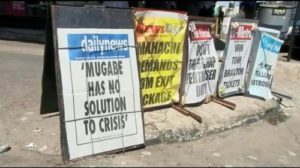 A blog/website has been launched, centred on the book edited by Tendai Murisa and Tendai Chikweche, called ‘Beyond the crises: Zimbabwe’s prospect for transformation’. A blog that appeared a few weeks back offered a useful analysis of the current predicament, arguing following Brian Raftopolous, for the need to go beyond the polarised divide between a politics of redistribution and a politics of rights; and that in fact both are needed.
A blog/website has been launched, centred on the book edited by Tendai Murisa and Tendai Chikweche, called ‘Beyond the crises: Zimbabwe’s prospect for transformation’. A blog that appeared a few weeks back offered a useful analysis of the current predicament, arguing following Brian Raftopolous, for the need to go beyond the polarised divide between a politics of redistribution and a politics of rights; and that in fact both are needed.
Tendai Murisa, currently executive director of Trust Africa, formerly a PhD student at Rhodes, and a researcher at the African Institute of Agrarian Studies, working with the late Sam Moyo, is one of the key drivers. The book and the various blogs are important reading for anyone concerned with the future of Zimbabwe. The book contains chapters on changing policy regimes (Murisa and Nyaguse), microfinance, business and small-scale enterprises (Chikweche and others), agrarian issues (Murisa and Mujyei), including gender dynamics, accumulation and land reform (Mutopo); and biodiversity, climate and environmental change (Ndebele-Murisa, Mubaya, Mutasa). All are worth a read. I however want to concentrate on the beginning and end of the book, and the discussion of the need for a transformation in Zimbabwe. They even offer a manifesto.
What is refreshing about this discussion is that it is non-partisan and barely mentions the internecine wars of party politics. It discusses politics in its broader sense, as the modes of governance required for a successful, prosperous, inclusive society. That Zimbabwe is far from this ideal is very plain, and is discussed across the book. Murisa in particular makes the case that a new politics needs to be built from the ground up, generated from the energies, innovations and solidarities of local communities. Only then will the corrupt, patronage-based politics of the centre – emanating from all sides – be challenged.
This argument picks up from Murisa’s own research that documented the emergence of forms of associational life on new resettlements following land reform. It is an important piece of work that points to the importance of mutualism, social connection and relationship building for any new activity – in this case new forms of production on the land. Extending this argument to wider society, the book makes the case that this has been lost, captured by a venal politics of greed and corruption, and that any transformation must instead emerge from a base, one rooted in solidarity, trust, and mutual cooperation, developing a civic pact that goes beyond shallow, performative participation.
Now of course in the face of the power of the party-business-security state, this may seem somewhat hopeful. But in order to get away from the obsession about leadership succession, pacts and alliances across parties, and how to make an electoral system less open to manipulation, a wider look at politics in its broader sense is important.
In his commentary at the launch of the book, Lloyd Sachikonye made some important points of gentle critique, however. There are dangers in imagining an ideal ‘community’ led response without thinking about class, identity, and power – and the array of differences that divide as well as bring together. He asked: What constellation of classes, groups and alliances should form its vanguard and base?” Murisa and colleagues, coming from a different generation of scholars less influenced by Marx perhaps, do not throw much light on the intersections of class, capital and the state in their analysis. This is a gap. But it is not incompatible with arguing for a new form of politics in my view.
As Nancy Fraser has long argued, an emancipatory politics that takes democracy seriously must address redistribution (and questions of equity and class difference), recognition (and issues of identity politics) and representation (but not just through occasional elections) together, rethinking the ‘public sphere’, and creating a ‘triple movement’ for an emancipatory politics. A revitalised politics in the face of globalised neoliberal capitalism and nationalist, populist politics (and Zimbabwe has its own particular version, but with striking echoes of what has emerged elsewhere), building new forms of political practice is essential. Whether this is the much-hyped hashtag activism of recent times or a more grounded building of new forms of action in particular places – or ideally interactions of the two through new forms of mobilisation – such moves must focus not just on unsettling existing forms of incumbent power, but also creating alternatives that, following Polanyi, re-embed market relations, socialising production in new ways.
At the same time, a new politics must allow for the recognition of diverse identities, including men, women, different ethnicities, creating a new voice for rural people, many of whom benefited from land reform. How this builds to new forms of representation is the big question, with political parties being so bereft of policy ideas and presenting a narrow, blinkered democratic imagination. As Sachikonye argues, this does not mean rejecting electoral democracy but reshaping it with a more vibrant engagement.
Having an intellectual debate about these issues in a non-partisan forum, based on scholarship from Zimbabwe, is really refreshing, and timely. Only with such input will Zimbabwe ever find a space beyond the seemingly endless crises.
This post was written by Ian Scoones and appeared on Zimbabweland
Post published in: Featured

